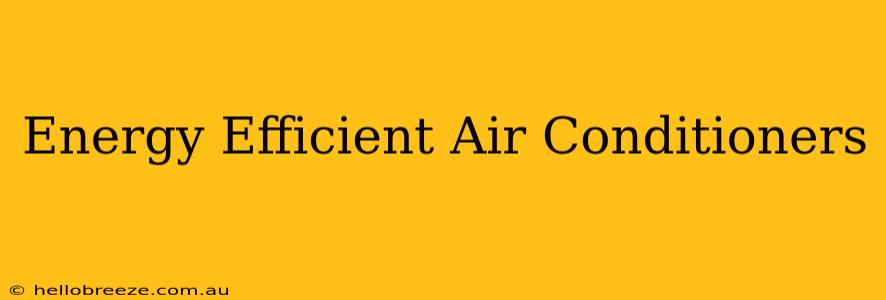Summer's scorching temperatures can leave you sweating, but your wallet doesn't have to. Choosing an energy-efficient air conditioner is key to staying cool while keeping your energy bills manageable. This guide explores the features and factors to consider when selecting the perfect energy-efficient AC unit for your home.
Understanding SEER Ratings: Your Key to Efficiency
The Seasonal Energy Efficiency Ratio (SEER) is the most important metric to consider when buying an air conditioner. This rating measures how much cooling you get for each watt of electricity consumed over an entire cooling season. The higher the SEER rating, the more energy-efficient the unit. While older models might have SEER ratings around 8, today's top models boast ratings of 20 or higher. Investing in a higher SEER unit will pay off in long-term energy savings.
What SEER Rating Do You Need?
The ideal SEER rating depends on your climate and budget. In warmer climates, a higher SEER rating is especially beneficial. While higher SEER units have a higher upfront cost, the energy savings over their lifespan often outweigh the initial investment. Consider consulting with a professional HVAC technician to determine the best SEER rating for your specific needs and local climate.
Features of Energy Efficient Air Conditioners
Beyond SEER ratings, several other features contribute to energy efficiency:
- Variable-Speed Compressors: Unlike single-speed compressors that constantly run at full power, variable-speed compressors adjust their speed based on cooling demand. This leads to more consistent temperatures and reduced energy consumption.
- Smart Features: Many modern AC units come with smart features like programmable thermostats and Wi-Fi connectivity. These allow you to control your AC remotely and optimize its operation for maximum energy savings.
- Energy Star Certification: Look for the Energy Star label. This certification signifies that the unit meets stringent energy-efficiency guidelines set by the Environmental Protection Agency (EPA) and the Department of Energy.
- Proper Sizing: An air conditioner that's too small will work harder and consume more energy to cool your space. Conversely, an oversized unit will cycle on and off frequently, leading to uneven temperatures and reduced efficiency. Professional sizing is crucial.
Saving Energy Beyond the AC Unit
While selecting an energy-efficient air conditioner is crucial, several additional steps can further minimize your energy consumption:
- Regular Maintenance: Schedule annual maintenance to ensure your unit is operating at peak efficiency. Clean or replace air filters regularly to improve airflow and reduce strain on the compressor.
- Proper Insulation: Ensure your home is well-insulated to minimize heat transfer. This reduces the workload on your AC unit and lowers your energy bills.
- Strategic Window Treatments: Use curtains, blinds, or shades to block sunlight and reduce heat gain.
- Smart Thermostat Use: Program your thermostat to automatically adjust temperatures when you're away or asleep.
Choosing the Right Energy Efficient Air Conditioner for Your Needs
Selecting the perfect energy-efficient air conditioner is a significant investment, but the long-term savings and environmental benefits are substantial. Consider your budget, climate, and home's size when making your decision. Don't hesitate to consult with a qualified HVAC technician for expert advice and professional installation. By making informed choices, you can enjoy a cool and comfortable home without excessive energy consumption.
Keywords: Energy efficient air conditioners, SEER rating, Energy Star, variable-speed compressor, smart thermostat, air conditioner maintenance, home insulation, energy savings, cooling efficiency, HVAC, air conditioner buying guide

